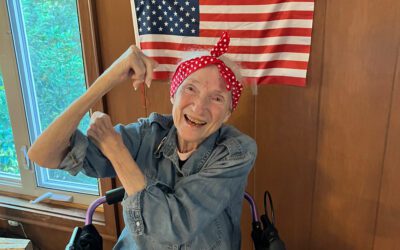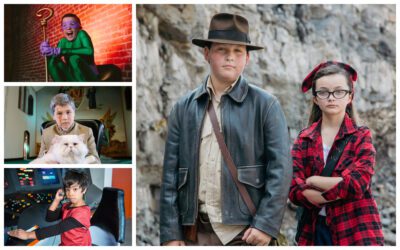There are very few things in life that can cloud Dr. Quyen Ha’s sunny disposition. Talking to the Vietnamese immigrant, who since 2013 has practiced medicine in Fort Smith, is a cacophony of laughter, upbeat observations and optimism for the future.
It is not the voice of someone who has known only joy that you hear, however – far from it. It is a voice that has cried out in longing, wept in mourning and prayed fervently for deliverance throughout the first several decades of life.
And it is those very trials, the suffering of hardship, that today rounds out his laugh as the multi-hued melody that it is. For only those who have tasted sorrow can know life’s full sweetness.
“I think if I hadn’t gone through things in my life, I wouldn’t be who I am today,” he says. “I know I wouldn’t be the physician I am today, and I would not be as successful as I am today caring for my patients.”
“The events that happened in my life, I just always knew there could be better things waiting for me. God told me to do this, maybe; He sent me through all these struggles so one day I could be what I am today.”
It doesn’t take much to understand Quyen’s outlook, a simple read of his remarkable memoir, A Runaway Teenager Who Found Freedom, does that for you. Released last September, it tells the incredible true story of Quyen and his quest to escape the poverty and oppressive political conditions of his homeland, risking everything to live free in America.
“I just wanted to go to America,” he says. “That was one of the best decisions I made for my life and my family. One move to America changed the whole family tree.”
Getting here, however, was an experience as harrowing as it is inspiring. Under the Communist regime that took power following the Vietnam War, attempting to leave the country was punishable by imprisonment and hard labor. And even if one eluded the authorities and the predatory smugglers of humanity who fed on people’s desperation, there was the ocean to contend with. Many refugee lives were claimed before they could ever reach the promised land.
Such odds were daunting for the most stouthearted adult, to say nothing of a kid from the poorest circumstances, barely into his teens. Yet that’s exactly what Quyen took on in search of a new life for himself and his family.
In his book, Quyen provides a vivid portrait of life in the postwar Vietnam slums and countryside and the desperate circumstances his parents faced to provide for their eight children. It was a process complicated by Quyen’s father being a former member of the South Vietnamese military, requiring a stint in a reeducation camp after the fall of Saigon and putting additional pressure on Quyen’s mother to provide.
Still, Quyen writes of remarkable benevolence on the part of his parents to help those around them, sharing what meager surpluses they could.
“Before April 30, 1975, we were – you could say – poor, but we were content because there were many families in our alley that didn’t have what we had,” Quyen writes. “We knew this because whenever we had extra food, Mom would always give it to the less fortunate families in the alley. We had three meals a day. We were able to attend school about half a day, five days a week.”
During his youth, Quyen split his time between living in the country with his father, who’d inherited a small plot of land, and in the city with his mother. Passages in the book describe the pain of separation he felt, missing his intact family unit and chafing under the tyrannical Communist rule.
“As the economy continued to spiral out of control, the Communist government also flexed its muscles to control its people,” he writes. “All books, music, and literature that were associated with the previous regime were searched and destroyed […] Every member in a home had to register with the local police and ask permission to travel out of town. Houses could be searched at any given time without probable cause. Curfew was imposed daily.”
Quyen’s yearning to reunify his family under better circumstances only solidified his resolve to reach America. His first attempt landed him in prison (briefly because of his age) because the transporters conspired with local authorities to betray the freedom-seekers for a fee. On his second attempt, he was just fourteen years of age.
“The boat inched its way to the border, and nothing could be heard except the engine,” he writes. “I didn’t dream of the open sea or freedom this time, but I prayed to God to help us pass the border without hearing an AK-47. The anxiety and fear of getting caught again were unfathomable, yet the thought of getting killed by the ocean didn’t scare me.”
Quyen survived the voyage, landing for a time in a processing camp in Indonesia from which the Vietnamese refugees planned their next move. Europe and Canada were easier to get into, but Quyen stuck to his desire to one day be an American. Eventually he’d make it to Texas and as the second half of the book details, earned his education, reunified his family and found his vocation in medicine.
At its core, A Runaway Teenager Who Found Freedom is an American success story, even with a native-born Vietnamese protagonist. And it is a story that continues to unfold as Quyen works to raise his sons to appreciate what has been built for them in the United States.
“As a father, I want to be sure that my kids don’t have to go through what I went through. At the same time, I want my kids to grow up to be productive citizens,” he says. “I really want this because now I see my kids having so much that sometimes I’m afraid. I’m afraid when you have so much given to you, you will stray.
“So, my dream, I guess you’d say, is I live for my kids now. I want to take care of my kids and my wife. At the same time, I don’t want to give them everything or they won’t be successful. I think that’s a big challenge.”
In the same vein, Quyen shakes his head at the criticism and discontent many native Americans feel toward their own country. He says if more people saw the U.S. through the eyes of immigrants – people stuck in third world poverty and destitution – they’d have a much better appreciation of what America still stands for in the world.
“I try not to be critical of people, but whenever a person comes to talk to me, I always tell them how good we have it here,” he says. “If they just have running water and a place to sleep and a toilet, they are so much richer than a billion people in the world. And I do mean that. They haven’t been to where I was and when you didn’t go through something, you can’t understand it. You cannot appreciate it.”
“So, while I can’t really blame them for being born into such freedom that they can’t really appreciate how things are elsewhere in the world, I try to educate people. I want to be an educator. I can educate that we have it great here in America. We really do. The best country, America is it! And I love it.”
Quyen is loath to criticize others because in his experience, he’s seen the benevolence of Americans much more than anything else. His book is filled with people who, upon arriving in the states, took him in, loaned or gifted him money or stood by his side in times of trial. He also notes with pride that he’s paid back everyone who helped him, with interest, and continues to honor their example by looking for ways to lift up others. That, he says, is the quintessential element of being an American.
“I want to give back what I have been given,” he says. “God told me to do this and now I want to give back to people. I do that with my patients. I see people in need. I just want to help them. It makes me feel so good that I’m in a position where I can do that.”
“I truly believe my book is about faith, love and hope and that anything is possible when you live in the greatest country in the world. The key things in my life have been to trust in God, love your family and work hard and everything will be OK. All my life I’m like that. I guess you could say that is my formula for success.”
You can find Quyen Ha’s book, A Runaway Teenager Who Found Freedom, on Amazon.com.




